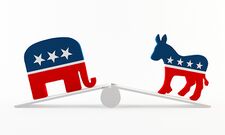State government triplexes
| Party Control of State Government |
|---|
 |
| Trifectas |
| A trifecta is when one political party holds the governorship, a majority in the state senate, and a majority in the state house in a state's government. |
Current trifecta status Party control of state government Historical and potential changes in trifectas |
| Triplexes |
| A triplex is when one political party holds the positions of governor, attorney general, and secretary of state in a state's government. |
Current triplex status Conflict between governors and AGs Conflict between governors and SoS |
| Analysis |
| Trifecta vulnerability in the 2024 elections Trifectas and triplexes Trifectas and legislatively referred constitutional amendments Who Runs the States report |
State government triplex is a term that describes when one political party holds the following three positions in a state's government: governor, attorney general, and secretary of state.[1]
As of November 24, 2024, there are 25 Republican triplexes, 20 Democratic triplexes, and 5 divided governments where neither party holds triplex control.
In states where the attorney general or secretary of state are appointed by the governor, Ballotpedia considers the office to be held by the governor's party for the purposes of defining triplexes until the governor appoints a specific person to those offices.[2] If a state does not have all three triplex offices, Ballotpedia considers that state a triplex if one party controls both triplex offices in that state.
This page includes the following additional information regarding state government triplexes:
- An overview of state government triplexes, including;
- A list of states with divided control;
- A list of states with single-party control
- An overview of changes in state government triplex status by year; and
- How triplexes align with trifectas.
Election results, 2024
Heading into the November 2024 elections, there were 25 Republican triplexes, 20 Democratic triplexes, and five divided governments where neither party held triplex control. Following the November 2023 elections, Republicans gained one triplex, Democrats neither gained nor lost any triplexes, and there was one less divided government than in 2022. Before the 2023 elections, there were 24 Republican triplexes, 20 Democratic triplexes, and six divided governments.
The triplex statuses of 15 states were on the ballot Nov. 5, 2024. Delaware, North Carolina, Oregon, and Washington retained their statuses as Democratic triplexes. Indiana, Missouri, Montana, North Dakota, Tennessee, Utah, and West Virginia retained their statuses as Republican triplexes. Pennsylvania and Vermont retained their statuses as divided governments. The triplex statuses in Maine and New Hampshire remained undetermined, since the legislatures in both states elect their respective attorneys general. The Maine legislature elects the secretary of state, and the New Hampshire governor appoints the secretary of state. Democrats retained control of the governorship and legislature in Maine, and Republicans retained control of the governorship and legislature in New Hampshire.
A state government triplex is a term to describe when one political party holds the following three positions in a state's government: governor, attorney general, and secretary of state.[3] In states where the attorney general or secretary of state is appointed by the governor, Ballotpedia considers the office to be held by the governor's party for the purposes of defining triplexes.[4]
Overview of state government triplexes
States with divided control
This table contains states where control of the top executive positions is split between the parties or one or more of the positions are held by independent or nonpartisan officers not appointed by the governor.
| States with divided control | |||
|---|---|---|---|
| State | Governor | Attorney General | Secretary of State |
| Kansas | Laura Kelly | Kris Kobach | Scott Schwab |
| Kentucky | Andy Beshear | Russell Coleman | Michael Adams |
| Nevada | Joe Lombardo | Aaron Ford | Cisco Aguilar |
| Pennsylvania | Josh Shapiro | Michelle Henry | Al Schmidt |
| Vermont | Phil Scott | Charity Clark | Sarah Copeland Hanzas |
States with single-party control
Democratic
Republican
Changes in triplex status
Changes in 2023
Non-election changes in 2023
- On January 17, 2023, Josh Shapiro nominated Al Schmidt (R) as acting secretary of the commonwealth, which broke the Democratic triplex in Pennsylvania.[5]
| Non-election triplex changes in 2023 | |||||
|---|---|---|---|---|---|
| State | Old triplex control | New triplex control | |||
| Pennsylvania | Democratic | Divided control | |||
Changes in 2022
The 2022 state executive elections led to the following results:
- The Republican Party gained a triplex in Iowa.
- The Democratic Party gained triplexes in Maryland and Massachusetts.
| Triplex changes as a result of the 2022 elections | |||||
|---|---|---|---|---|---|
| State | Pre-election triplex status | Post-election triplex status | |||
| Iowa | Divided control | Republican | |||
| Maryland | Divided control | Democratic | |||
| Massachusetts | Divided control | Democratic | |||
Non-election changes in 2022
- On January 10, 2022, David Scanlan (R) was sworn in as New Hampshire Secretary of State after William Gardner (D) retired. Scanlan's swearing-in created a Republican triplex in New Hampshire.
| Non-election triplex changes in 2022 | |||||
|---|---|---|---|---|---|
| State | Old triplex control | New triplex control | |||
| New Hampshire | Divided control | Republican | |||
Changes in 2021
The 2021 state executive elections led to the following results:
- The Republican Party gained a triplex in Virginia, which had previously been a Democratic triplex.
| Triplex changes as a result of the 2021 elections | |||||
|---|---|---|---|---|---|
| State | Pre-election triplex status | Post-election triplex status | |||
| Virginia | Democratic | Republican | |||
Non-election changes in 2021
On November 22, 2021, Steve Hobbs (D) was sworn in as Washington Secretary of State after Kim Wyman (R) resigned to take a job in the Biden Administration. Hobbs' swearing-in created a Democratic triplex in Washington.
| Non-election triplex changes in 2021 | |||||
|---|---|---|---|---|---|
| State | Old triplex control | New triplex control | |||
| Washington | Divided control | Democratic | |||
Changes in 2020
The 2020 state executive elections led to the following results:
- The Republican Party gained a triplex in Montana.
- The Democratic Party gained a triplex in Oregon
| Triplex changes as a result of the 2020 elections | |||||
|---|---|---|---|---|---|
| State | Pre-election triplex status | Post-election triplex status | |||
| Montana | Divided control | Republican | |||
| Oregon | Divided control | Democratic | |||
Changes in 2019
The 2019 state executive elections led to the following results:
- The Republican Party gained a triplex in Mississippi.
| Triplex changes as a result of the 2019 elections | |||||
|---|---|---|---|---|---|
| State | Pre-election triplex status | Post-election triplex status | |||
| Mississippi | Divided control | Republican | |||
Changes in 2018
The 2018 state executive elections led to the following results:
- The Democratic Party gained a net six triplexes, while the Republican Party lost a net four triplexes.
- Five states (Colorado, Illinois, Maine, New Mexico, and Wisconsin) that had been under divided control gained Democratic triplexes.
- Four states (Arizona, Kansas, North Dakota, Nevada) that previously had Republican triplexes lost those triplexes.
- Alaska's independent triplex was replaced by a Republican triplex.
- Michigan's Republican triplex was replaced by a Democratic triplex.
| Triplex changes as a result of the 2018 elections | |||||
|---|---|---|---|---|---|
| State | Pre-election triplex status | Post-election triplex status | |||
| Alaska | Independent | Republican | |||
| Arizona | Republican | Divided control | |||
| Colorado | Divided control | Democratic | |||
| Illinois | Divided control | Democratic | |||
| Kansas | Republican | Divided control | |||
| Maine | Divided control | Democratic | |||
| Michigan | Republican | Democratic | |||
| North Dakota | Republican | Divided control | |||
| Nevada | Republican | Divided control | |||
| New Mexico | Divided control | Democratic | |||
| Wisconsin | Divided control | Democratic | |||
Changes in 2017
The 2017 state executive elections led to the following results:
- The Democratic Party gained a triplex in New Jersey, which had previously been a Republican triplex.
| Triplex changes as a result of the 2017 elections | |||||
|---|---|---|---|---|---|
| State | Pre-election triplex status | Post-election triplex status | |||
| New Jersey | Republican | Democratic | |||
Non-election changes in 2017
On August 3, 2017, West Virginia Governor Jim Justice changed his party affiliation from Democratic to Republican, giving the Republican Party a triplex in the state.
| Non-election triplex changes in 2017 | |||||
|---|---|---|---|---|---|
| State | Old triplex control | New triplex control | |||
| West Virginia | Divided control | Republican | |||
Triplexes and trifectas
- See also: State government trifectas and triplexes
A state government trifecta is a term to describe when one political party holds majorities in both chambers of the state legislature and the governor's office.
As of November 24, 2024, there are 23 states with both a Republican trifecta and triplex, 17 states with both a Democratic trifecta and triplex, and 10 whose trifecta and triplex statuses are different.
Currently, 40 of the 50 states have a trifecta and a triplex of the same party.
State breakdown
See also
Footnotes
- ↑ Ballotpedia chose to highlight these offices because they are typically the most visible positions in states and serve important administrative functions.
- ↑ This is because it is very uncommon for an attorney general or secretary of state appointed by a governor to often be in direct conflict with that governor.
- ↑ Ballotpedia chose to highlight these offices because they are typically the most visible positions in states and serve important administrative functions.
- ↑ This is because it is very uncommon for an attorney general or secretary of state appointed by a governor to often be in direct conflict with that governor.
- ↑ Pennsylvania Department of State, "Acting Secretary of the Commonwealth," accessed April 17, 2023
| ||||||||||||||||
| |||||||||||
| ||||||||||||||||




